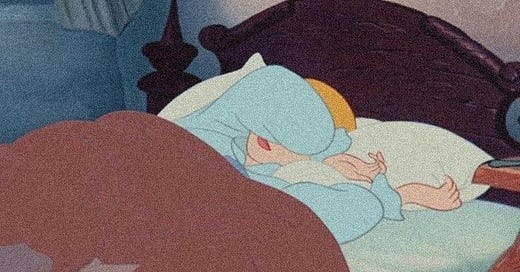Another week, another gender gap. A study carried out by Nasa began as an effort to keep tabs on the energy levels of astronauts but has actually revealed that tiredness in women is habitually underestimated. Nasa infamously considered packing 100 tampons for Sally Ride, the first American woman in space, for her week-long mission in 1983, so it's not their first rodeo of unwittingly demonstrating a vast social misunderstanding of women and their health.
For anyone like myself, as soon as the debate of early bird versus night owl arises it is preferable to be as far away from the conversation as possible. I am no good late at night and I am definitely not my best before the sun has risen, almost as if my body has adapted to fit in with the actual working day. Society, however, sees this as lazy and indulgent, particularly for a woman. By not forcing yourself up at 6 am or drinking a whole cafetière of coffee just so you can work past midnight, you are demonstrating how you reject the grind and demonstrate a disregard for femininity. After all, women are expected to always do more, pretty much from the minute they vacate the womb (see Dolly Alderton’s redoubtable words below). Her laziness has a direct impact on her home, work, and overall appearance to the outside world. His laziness just affects him, a personality quirk rather than a perpetual failing.
“To be an empirically attractive young man, you just have to have a nice smile, an average body type (give or take a stone) a bit of hair and be wearing an all-right jumper. To be a desirable woman – the sky’s the limit. Have every surface of your body waxed. Have manicures every week. Wear heels every day. Look like a Victoria’s Secret Angel even though you work in an office. It’s not enough to be an average-sized woman with a bit of hair and an all-right jumper.”
— Dolly Alderton, Everything I Know About Love
The fact that, to my knowledge, I don’t personally know a single man who wears mascara is a testament to the expectations set upon women from the second they leave the house. If I see a male colleague with dark circles and rumpled hair, my mind instantly assumes he has been working hard and is therefore somehow even more worthy of appreciation and praise. If I rocked up to the office without a scrap of makeup on and having forgotten to brush my hair, I can guarantee at least one “gosh you look tired.”
The irony is that it has been consistently proven that women scientifically need more sleep than their male counterparts. Some say we need 20 minutes more, others suggest as much as over an hour. According to Kevin Morgan, emeritus professor of psychology at Loughborough University’s Clinical Sleep Research Unit, women usually need more sleep than men because of a combination of the burden of emotional responsibility they often shoulder at work and home.
But, if we are meant to be getting between 7-9 hours in a night as it is, where exactly is this extra time meant to come from when an early night is considered babyish and a lie-in makes you a slob? The true non-negotiable in all of this, however, is that no matter how tired we feel from being relentlessly behind on rest, we must make sure to cover it up to the rest of the world.
Nasa’s study demonstrated how women make more of an effort socially when tired. By holding eye contact and remaining expressive and attentive, observers underestimated their fatigue by 1.3 points. The male case studies, on the other hand, had their tiredness overestimated by 0.9 points. Long story short, the historic and almost certainly incorrect assumption that men are in some way a more stoic sex is as prevalent as ever. The long road to closing the sleep crack is far from over but allowing women to be tired would be a great first step.





This is amazing.
I am not ashamed of the naps I take daily.
LOVED this, Annabel! So well written and so painfully true. (Plus, I almost choked at Nasa sending Sally off to space for a week with 100 tampons. Stop!!!)